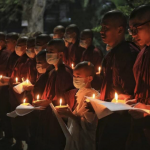
photo: supplied
Myanmar`s senior abbots have tried to influence the events unfolding in the country after February,1 for the better. As it is widely known, they have not succeeded so far.
According to The Irrawaddy, just three days before the military’s power seizure, members of the Ma Ha Na (Burmese short form for State Buddhist authority) had requested both sides as represented by members of the National League of Democracy and the military, to find a peaceful solution regarding the conflicting issue of “voters´ fraud”.
Later in February, the chairman of the Ma Ha Na, Bhamo Sayadaw Bhaddanta Kumara, called for negotiations of “all responsible people, otherwise Myanmar would be wiped off the world map”. He did so at Buddhist University in Mandalay.
The next day, some putative ultranationalist monks acted against protesters of the Civil Disobedience Movement (CDM) in Yangon.
On March, 16, as Myanmar Now reported, abbots of the Ma Ha Na announced their decision to suspend all Buddhist services, tailoring their action consistent with the CDM-mode, due to the brutal violence directed against the protesters by military and police forces. According to the initiators this statement would have to be brought before the Union Ministry of Religious Affairs and Culture on March, 18.
As of today, March 31, nothing could be heard or read about any outcome of the procedure.
The political role of Buddhism in modern Myanmar has a long and ambivalent history, starting in the 1920s. This was the time, when Buddhist monks together with the students of the then Rangoon University assumed a leadership role in protests against British colonial rule. In the midst 1960s as well as in the 1970s, monks protested consequently against the military government. They did so also in 2007, when monasteries in Pakokku initiated protests, later called the “Saffron Revolution”.
On the other hand, extremists like the opalescent monk Wirathu have become synonymes for nationalism, racism, and hate-speech in recent years.
In 2013 the Myanmar Times wrote a short article on a Buddhist statement, authored by monks of the 2007-network, warning the country could return to military rule, hereby invoking “loving kindness”. For various reasons, those monks were “anxious” that “U Thein Sein’s government could be toppled by the military as U Nu was in 1962”. Instead, it was the incoming government of Aung San Suu Kyi in 2021, which was “toppled by the military”.
The potential political role of Buddhism in the present situation´could become a CDM-asset.
